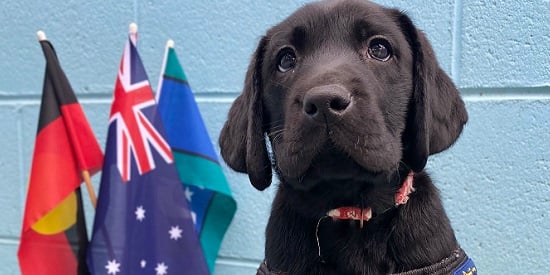NAIDOC puppy celebrates connection between NIKERI Institute and Vision Australia
Deakin news
Earlier this year, Vision Australia marked NAIDOC Week by naming a litter of potential Seeing Eye Dogs pups in honour of Aboriginal and Torres Strait Islander culture. Four names were chosen demonstrating a strong connection to Country and acknowledgment of First Nations Communities and heritage: Ngawan, Kirrip, Mirring, and Nikeri.
Nikeri, named after the National Indigenous Knowledges Education Research and Innovation (NIKERI) Institute, celebrates the relationship between the education space and Vision Australia through Indigenous Knowledges academic Kim Browne and her Seeing Eye Dog, Raya.
"Raya and I have been working together in partnership for over three years. As a Seeing Eye Dog, Raya greatly assists in my mobility and guidance in all areas of my life and this has been greatly supported by Vision Australia," said Kim.
"As a full-time lecturer and researcher at NIKERI Institute, my role involves accessing all facilities and spaces and also travelling to new places. Raya confidently guides me throughout all these endeavours in my daily life."
Currently, in Australia, one in five people identify as living with a disability and Kim notes that "our workforce in Australia has been slow to increase employment levels and fully include people experiencing disability."
“At NIKERI Institute, Raya and I are an important part of the unit. Vision Australia recognises this partnership and our value as part of our workplace, reaching out to ask to have a puppy to be named Nikeri as part of NAIDOC Week.
"This recognition upholds and values the importance of Indigeneity, inclusion, and diversity in the workplace at NIKERI Institute."
Professor Mark Rose, Deakin's Pro Vice Chancellor, Indigenous Strategy and Innovation, commented that there was a "significance [to] the intention" of Nikeri's naming.
Professor Gabrielle Fletcher, the Director of NIKERI Institute, acknowledges the important role Kim and Raya play in the Institute's community.
"Our NIKERI community is deeply moved and honoured by the naming of Vision Australia's NAIDOC puppy, Nikeri," said Professor Fletcher.
"We very much thank our colleagues, Kim Browne and Raya, her Seeing Eye Dog and companion, and the testament of their ongoing relationship with Vision Australia.
"We are humbled that we have been woven into this wonderful story."
The puppy's name, Nikeri, symbolises the relationships Kim and Raya have developed through their work at Deakin and the crucial part of community that a Seeing Eye Dog becomes. Raya's presence within the NIKERI Institute community provides mobility and opportunity for her handler Kim, and in her own right is considered a member of the team with Raya's photo included on the staff photo wall.
Professor Fletcher highlights how community is a central theme in the relationship between NIKERI Institute and Vision Australia.
"It is important to recognise the diversity of our First Nations community and understand different systems of kinship and reciprocity, and the variousness of opportunities for support, enablement and education this affords," Professor Fletcher said.
"We commit to co-constructed and sustained understandings, and extend this invitation to our Deakin community in activating and celebrating the work of Kim and Raya and Vision Australia."
Community and inclusion are essential experiences for people living with disability, and Kim and Raya have found that at Deakin. A space of recognition and inclusion has been created - one that other students and staff with low vision or blindness can appreciate and look to achieve their own educational opportunities.
Share this story

